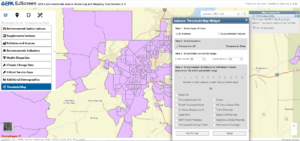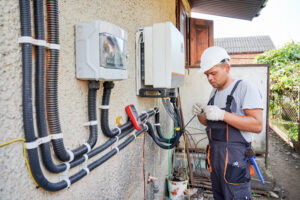Exploring Environmental Justice & Energy Equity in North Carolina: State Programs and NC Department of Environmental Quality
By: Dawn Haworth, Communications Intern
This is the second post of a three part blog series that examines the progress being made to advance Environmental Justice from a clean energy standpoint. The series will cover federal programs and incentives that aim to benefit historically disadvantaged communities, and how those initiatives impact communities at the state and local level.
What is North Carolina doing with federal funding and guidance?
The first blog of our Environmental Justice (EJ) series covered major federal programs, and it is crucial to explore how federal policies affect communities and individuals within our state, as North Carolina is the birthplace of EJ.
This blog will cover the different programs in North Carolina that have been vital to advancing EJ within the state, and look into the workings of the NC Department of Environmental Quality (NCDEQ).
NC Executive Order 292
Governor Cooper issued Executive Order 292 in October 2023 which reestablished the Secretary of Environmental Quality’s Environmental Justice and Equity Advisory Board as the Governor’s Environmental Justice Advisory Council. The Council consists of local residents and state agency employees that will provide guidance and recommendations on EJ to the Governor. This ensures that the state government will have a central focus on advancing environmental justice in decision-making processes.

The order also requires cabinet agencies to establish at least three EJ goals and measurable outcomes, which are open to the public to comment on before they are finalized. The commenting period for these goals closes on April 22, 2024. More information about the agencies’ goals can be found here.
Environmental Justice Thriving Communities Technical Assistance Center (EJ TCTAC)
As a part of the Federal Thriving Communities Network Initiative, the EJ TCTAC program consists of 16 centers selected by the EPA in partnership with the Department of Energy (DOE). Each center has been allocated at least $10 million to make improvements in accessibility for communities with EJ concerns.
North Carolina belongs to Region 4, which is covered by two centers: RTI International and the Deep South Center for Environmental Justice (DSCEJ). RTI International has created the Resource for Assistance and Community Training in Region 4 on Environmental Justice (REACT4EJ), which organizes community building and training events across the region to support those working on EJ issues. DSCEJ leads the Community Investment Recovery Center (CIRC), which also provides technical assistance and empowers underserved communities.
Policy integration is one of the main ways for the government to give back to historically disadvantaged communities. Ensuring funds and resources are accessible to these communities allows for long-standing EJ concerns to be addressed and for necessary changes to take place.
Home Energy Rebates
The Home Efficiency Rebates (HER) and Home Electrification Appliance Rebate program (HEAR) included in the IRA together provide North Carolina with $208 million for energy efficiency rebates. Funding has not yet been allocated, but the state has begun applying for a planning grant in January 2024. This guide created by NCCETC gives helpful information about home energy upgrades and the rebates that will be available.
Why is the NC Department of Environmental Quality important in advancing Environmental Justice?
At the center of environmental regulation in North Carolina, NCDEQ focuses on “providing science-based environmental stewardship for the health and prosperity of all North Carolinians.”(NCDEQ) Federal funding provided by agencies such as the EPA and the DOE under Justice40 guidelines applies to several NCDEQ programs.
Does NCDEQ follow the Justice40 Guidance?
NCDEQ uses the CEJST mapping tool as recommended in the Justice40 initiative, to identify disadvantaged communities when prioritizing funding and in outreach and public engagement efforts. In addition to this mapping tool, the department uses the NCDEQ Community Mapping System, which identifies potentially underserved communities within the state. EPA’s EJScreen is also utilized to inform NCDEQ staff of community demographics.

Maya Hoon, NCDEQ’s Title VI and Environmental Justice Coordinator states “with all federal funding opportunities, NCDEQ is working with the appropriate federal agencies to follow and meet the applicable Justice40 requirements.
Weatherization Assistance Program

The U.S. Department of Energy’s Weatherization Assistance Program increases energy efficiency in low income households by reducing energy costs. NCDEQ administers this program in low income communities within the state, which creates job opportunities in addition to making utility bills more affordable while also saving energy. The Bipartisan Infrastructure Law granted five years of funding for this program, of around $89 million, which NCDEQ’s State Energy Office anticipates to aid upwards of 6,000 households across the state.
Climate Pollution Reduction & “Solar for All” Grants
NCDEQ has also worked to apply for additional funding under the Climate Pollution Reduction Grant program, and the Greenhouse Gas Reduction Fund “Solar for All” grant. As the lead agency on a statewide application for Climate Pollution Reduction Grant funding, NCDEQ aims to use this funding to assist states, local governments, territories, and recognized tribes in creating plans for reducing harmful air pollutants like greenhouse gas (GHG) emissions. Under NCDEQ, the EnergizeNC coalition requested $250 million for the Solar for All grant to be used toward developing and implementing solar energy and storage that aims to benefit over 20,000 disadvantaged residents, including those on tribal lands. At the conclusion of the five-year program, an anticipated 69.5 megawatts of residential solar will be produced. To receive updates about upcoming webinars, meetings, and other input opportunities related to the Solar for All grant, sign up here.
American Rescue Plan Act
The Division of Water Infrastructure (DWI) at NCDEQ has been working to administer $2.1 billion of American Rescue Plan Act (ARPA) funds. ARPA is a COVID-19 relief and economic recovery bill that was signed into law on March 11, 2021. The $2.1 billion administered by DWI has gone to over 800 projects focused on drinking water, wastewater, and stormwater planning for communities in North Carolina. The projects are anticipated to improve infrastructure and advance economic development. Hoon says “in allocating the funding, the Division prioritized disadvantaged communities and affordability criteria to ensure equitable, affordable access to drinking water and resilient infrastructure.”
DWI works to benefit disadvantaged communities with funding opportunities for water infrastructure projects. A total of $13 million in ARPA funds was allocated by the State Energy Office for energy efficiency and assistance. $9 million was distributed to low-income household energy projects that allowed 761 households to receive improvements in repairs, weatherization, energy efficiency, and clean energy. $4 million was given to weatherization projects aimed at reducing energy consumption. In partnership with NC GreenPower, around $800,000 went towards installing LED lighting in 60 school gymnasiums across “economically distressed counties.”
Tracking federal and state investments is vital to ensure funding reaches the intended communities and residents. It is important to include all communities in the growing clean energy field, and to ensure that everyone benefits equally from new technologies that advance energy efficiency. As governments work to implement EJ practices across their departments, it is necessary to recognize historic injustices, and work towards creating a healthy and clean environment for all people.